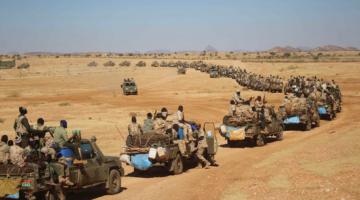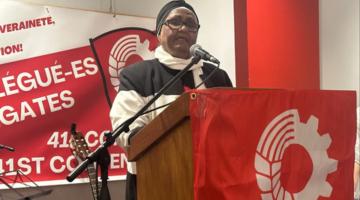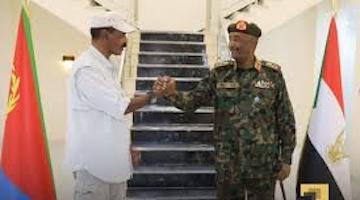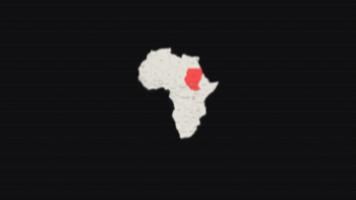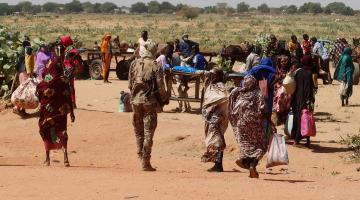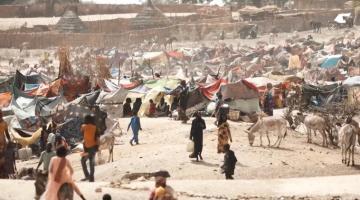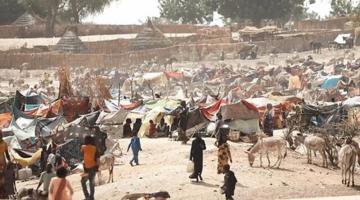In the aftermath of the violent repression of protesters on June 30, sit-ins have been organized in various parts of Sudan even as the military junta tries to consolidate power.
This article was originally published in Peoples Dispatch.
Revolutionary slogans and music defying the military junta continue to resonate from at least four sit-in protests in Sudan as on Monday, July 11, eleven days after security forces injured over 600 during the landmark anti-coup protests on June 30. Efforts are underway to organize a total civil disobedience campaign and political general strike.
Sudan’s pro-democracy protest movement is arguably at its strongest since the coup on October 25, 2021, and growing despite the continuing attacks on sit-ins and the custodial torture of detainees. The over 5,000 neighborhood Resistance Committees (RCs) across Sudan, which are leading the struggle against the junta, “are working hard to produce a unified political charter”, said Muaz Khalil, spokesperson of the RCs in Al Kalakla Al Quteia neighborhood of capital city Khartoum.
Currently, the two charters that have been proposed – one by the RCs in Khartoum and the other by RCs in El Gezira State’s capital Wad Madani – are being debated at the sit-ins. Once all the RCs reach agreement on a unified political charter, “we will present it to the political parties and trade unions for signature, and unite the civil bloc resisting the coup on the basis of a clear political vision,” Khalil told Peoples Dispatch.
“At the same time, the RCs will continue revolutionary actions, including processions, vigils, sit-ins and civil disobedience. We will use all the tried-and-tested methods of bringing down dictatorships,” he added.
“The multiple sit-ins represent an advanced revolutionary step,” noted the Sudanese Communist Party (SCP), whose members have for long been working in the RCs, trade unions and other mass organizations. Describing the June 30 demonstrations from which the sit-ins culminated as a milestone in the resistance to the coup, the SCP observed that its significance was not only in that it drew millions to the streets, but in that it was “spread across all cities and villages of Sudan”.
Pointing out that the mobilization “was based on diverse forces including workers, farmers and professionals, along with the RCs”, the SCP has called for the formation of a Unified Center of all mass movements to coordinate the final blow to oust the junta.
Coup leader’s maneuver
Coup leader General Abdel Fattah al Burhan is also maneuvering to consolidate his stranglehold over key state powers, after withdrawing the army from the talks with centrist and right wing parties.
All the civilians with a symbolic membership in the junta-controlled Sovereignty Council were sacked by July 6, as Burhan moved to concentrate sovereign power in the Supreme Council of Armed Forces, composed of himself and a small clique of his confidants.
Cloaking this maneuver as a demonstration of the army’s willingness to cede power to a civilian government, Burhan announced in his televised speech on June 4 that “the armed forces will not stand in the way” of transition to democracy.
He claimed that the army had withdrawn from the talks in order to “allow the political and revolutionary forces and other national components to sit down and form a government of independent (technocrats)”.
The army chief went on to call on all civilian political forces “to engage in an immediate, serious dialogue.. to form a government.” By not excluding the National Congress Party (NCP) of the ousted dictator Omar al-Bashir, he has in effect called on the revolutionary forces organizing to overthrow the junta to reach a consensus with Islamists, at whose behest the coup was carried out.
“After the formation of the executive government, the Sovereignty Council will be dissolved,” he said. In its place, “a Supreme Council of armed forces will be formed from the Sudan Armed Forces (SAF) and the Rapid Support Forces (RSF) to take over the high command of the regular forces and be responsible for security and defense tasks, and related responsibilities.”
International actors play along
Burhan did not mention in his speech that the “related responsibilities” included controlling the country’s central bank, deciding its foreign policy and exercising authority over sovereign matters. The latter includes the authority to declare war, or to send troops to fight in others’ wars, such as the one led by Saudi Arabia and backed by the US against Yemen.
However, days before his speech, the US and Saudi Arabia, who are sponsors of the negotiation under the Trilateral Mechanism, had been informed about these “related responsibilities” of the Supreme Council in a confidential memorandum. The memorandum was also sent to the United Nations Integrated Transition Assistance Mission in Sudan (UNITAMS), African Union (AU), and the seven-countries regional bloc of Intergovernmental Authority on Development (IGAD), which together formed the Trilateral Mechanism in March.
None of these international actors, however, indicated this knowledge in their statements after Burhan’s withdrawal from talks. Instead, they simply reiterated his call to civilian political parties to reach a consensus.
US State Department spokesperson Ned Price, for instance, merely said in a press briefing on the day after Burhan’s speech, “we took note of General Burhan’s.. commitment to dissolve the Sovereign Council once a civilian government has formed.”
Referring only to Burhan’s decision to withdraw the army from political negotiations, the UN said in a press note that its “Secretary-General hopes this creates the opportunity for Sudanese to reach an agreement that ultimately leads to a civilian-led transition to democracy in Sudan.”
A protester from Omdurman opined that the word ‘ultimately’ is another indication that for this apex international body, democracy – for which Sudanese youth have been risking their lives and limbs virtually everyday since the coup – is not an immediate objective.
“With the decision of the military to no longer participate in the talks facilitated by the Trilateral Mechanism, the basis for this particular format of military-civilian dialogue no longer exists for the time being,” read the joint-statement by the Trilateral Mechanism on June 6.
“Trilateral Mechanism encourages all civilians to talk to one another to agree on a way out of the crisis,” its statement added. Analysts and protesters have pointed out that this statement complements Burhan’s attempt to portray the lack of consensus between the civilian forces as the root of the crisis in Sudan, rather than the coup itself.
The Trilateral Mechanism and its sponsors have not raised any concern that through the Supreme Council, the army is trying to legitimize its capture of the key state powers that ought to be controlled by the civilian political forces held to democratic account.
All’s not well in the military
It is of note here that the whole of the army is not unified behind Burhan’s struggle to keep power. In fact, the original purpose of the Supreme Council, the formation of which had already been decreed by Burhan in January, was to protect the Sovereignty Council, which he heads, from coup attempts by junior ranks in the army.
Sections of junior officers – who are also reeling under the economic distress – are suspected of being sympathetic to the December Revolution. In order to keep them in check, Burhan enlisted the support of the leaders of RSF – a notorious militia that carried out the alleged genocide and crimes against humanity during the civil war in Darfur region under the reign of dictator Omar al-Bashir.
Feeding on the gold under Darfur’s land from which millions of people were displaced by RSF’s atrocities, this paramilitary, under the command of General Mohamad Hamdan Dagalo aka Hemeti, grew over the last decade to become among the wealthiest organizations in Sudan.
Hemeti’s brother Abdul Rahim Dagalo owns the company Al Gunade, which has nearly monopolized gold mining in Darfur. Sudan Now had reported in January that according to Burhan’s decree, along with himself, his chief of staff, deputies and regional commanders, the Supreme Council’s members included Hemeti and his brother Abdul Dagalo.
Dagalo was the one who reportedly ordered the RSF to clear the sit-in demonstration outside the army HQ in Khartoum on June 3, 2019, leading to a massacre of over 100 people.
In the aftermath of this massacre, the centrist and right wing political parties of the coalition, Forces of Freedom and Change (FFC) caved in. They entered into negotiations with the junta, which ended with a power-sharing agreement on the basis of which a joint civilian-military transitional government was formed in August 2019.
This government was overthrown in the coup of October 2021 by Burhan. Nearly eight months later, amid an escalation in protests in June after the third anniversary of the massacre and intensifying repression, the FFC met the junta leaders again.
These US-Saudi-sponsored talks under the aegis of the Trilateral Mechanism were boycotted by the RCs, which have organized protests daily since the coup, drawing hundreds of thousands to streets on many occasions.
With the slogan “No Negotiation, No Partnership, No Legitimacy,” the RCs have refused to accept a return to any arrangement where political power is shared with the army. They remain steadfast on not settling for anything less than the complete overthrow of the military junta and the prosecution of its generals for all the atrocities committed under their command.
While the FFC maintained that the meeting “was not a step towards partnership (with military rule), but to end it”, the radical components of the pro-democracy movement insisted that power to prosecute the generals cannot be negotiated away from them. They argued that participation in these talks was giving the junta a legitimacy it did not have in the eyes of the Sudanese people.
Yet, the FFC and the junta reached agreement on 80% of the issues, Volker Perthes, UNITAMS head and the UN Secretary-General’s representative in Sudan, told Al Hadath on June 29. After speaking to Burhan the same day, the US Assistant Secretary of State for African Affairs Molly Phee “welcomed Gen al Burhan’s commitment to direct security forces to allow the Sudanese people, across all of Sudan, to exercise their rights to peaceful assembly on June 30.”
On that day, Burhan’s security forces killed nine protesters and injured at least 629 in Khartoum state alone, according to the Central Committee Sudanese Doctors (CCSD). This is the highest number of injuries in a single day since the coup. Among the injuries were 58 bullet wounds, 64 head injuries from direct hits by tear gas canisters or stun grenades, and 12 eye injuries. In case of at least 10 injuries, protesters were run over by armored vehicles of the security forces.
“We are heartbroken at the tragic loss of life in yesterday’s protests,” the US embassy in Khartoum tweeted the next day. Nevertheless, “we urge all parties to resume negotiations,” it added, even as the FFC was receiving increasing flak from the protest movement.
“We assure the international community that the Sudanese people have made their decision, and their decision is that there will be no negotiation and no partnership with the military,” RC spokesperson Khalil said categorically. “We will not give legitimacy to the junta by engaging in talks with them. Those who were a part of the coup and worked to kill the protesters can never be part of the solution,” he added.
Meanwhile, the FFC appeared to backtrack. “There were no negotiations (with the coup leaders) or agreement on 80% of its agenda,” FFC leader Omer al-Dogair of the Sudanese Congress Party (SCoP), said in a press conference on July 3 to clarify the coalition’s position in the aftermath of June 30 violence. “The discussion (with the junta) was about the procedures according to which the dialogue will be held,” he explained.
Another FFC member, Yasir Arman, the deputy chair of Sudan People’s Liberation Movement-North (SPLM-N), said that the “bullets that penetrated the body of the martyrs blew up the political process.”
The bullets did not, however, force a retreat or compromise on the protest movement. Amid all the attacks by security forces in Khartoum city on June 30, the marches had culminated into a sit-in demonstration outside the Al-Jawda hospital.
“A dagger in the hearts of the enemies of the revolution”
“The June 30 march is a turning point in our efforts to overthrow the coup authority, and there are no words to adequately describe the bravery exhibited by our people’s revolutionaries since yesterday,” the Khartoum RCs said in a statement on July 1. “The only description of what transpired is that it is the December Revolution’s rebirth.”
“All revolutionaries” were urged “to support the sit-in at Al Jawda Hospital.” This sit-in demonstration, which was the first to continue overnight since the coup, grew in size.
More sit-ins quickly followed, and their total number had grown to six when Burhan gave his speech on July 4. In addition to Al Jawda hospital, two sit-ins were organized in Omdruman and Khartoum Bahri (North) and one in Madani,
By then, at least 114 protesters had been killed by the security forces since the coup on October 25. More than 5,400 were injured in the protests in the eight months since, averaging over 21 injuries per day. Over 450 of the injured are still undergoing treatment. 36 have lost limbs or organs and eight are paralyzed, according to a compilation published by the Hadreen Organization.
Like his previous announcement on May 29 about lifting the state of emergency, Burhan’s announcement on July 4 about the army’s willingness to cede power to a civilian government has made no difference to the pro-democracy protesters on ground, who continue to come under attack.
Within about an hour of Burhan’s speech, his security forces attacked three sit-in demonstrations, including the one outside Al Jawda, causing further injuries. Despite having to retreat from some of the sites under attack, protesters have been quick to regroup and re-occupy them.
On July 8, however, the Khartoum RCs decided to voluntarily lift the sit-in outside Al Jawda to avoid inconveniencing the hospital.
“The sit-in was a dagger in the hearts of the enemies of the revolution – claiming lands, roads and arenas to express the rejection of the regime. The sit-in served as a forum for revolutionary discussions.. and the exchange of opinions on the future of the revolution and its challenges,” the Coordination of RCs in Khartoum city said in a statement.
Subsequently, on Monday, July 11, the RCs in Omdurman decided to lift one of the two sit-ins in the city in order to focus work on the upcoming marches and civil disobedience actions, including public barricading.
The other four sit-ins continue protesting amid reports that their comrades under detention are being tortured and denied of medical care. Hundreds were detained or went missing on June 30 alone.
CCSD reported on June 8 that one of them, after being assaulted in custody, was inflicted with second and third degree burns with a lighter along the length of his arm and the side of his back. Instead of transferring him to a hospital, he was held in police custody for a week without medical care, before Emergency Lawyers secured his release. Only two months before the coup, Sudan had ratified the UN Convention against Torture and Other Cruel, Inhuman or Degrading Treatment or Punishment (UNCAT).
This was not the first or the worst case of torture since the coup. Protesters risking death and torture everyday know that it will not be the last. But “the blood of martyrs and precious sacrifices will not be wasted by the masses,” assured SCP’s Political Secretary, Mohamed Mokhtar Al-Khatib.
Pavan Kulkarni is a writer for Peoples Dispatch.

